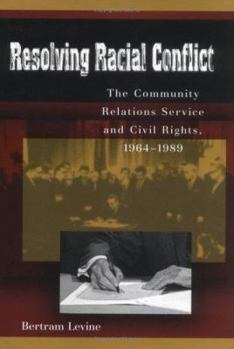Resolving Racial Conflict: The Community Relations Service and Civil Rights, 1964-1989
In 1964, when the Civil Rights Act was passed, Congress wisely created an agency based in the U.S. Department of Justice to help forestall or resolve racial or ethnic disputes evolving from the act. Mandated by law and by its own methodology to shun publicity, the Community Relations Service developed self-effacement to a fine art. Thus the accomplishments, as well as the shortcomings, of this federal venture into conflict resolution are barely known in official Washington, and even less so by the American public. This first written history of the Community Relations Service uses the experiences of the men and women who sought to resolve the most volatile issues of the day to tell the fascinating story of this unfamiliar agency.
This multiracial cadre of conciliation and mediation specialists worked behind the scenes in more than 20,000 confrontations involving racial and ethnic minorities. From Selma to Montgomery, at the encampment of the Poor Peoples' Campaign in Resurrection City, to the urban riots of the sixties, seventies, and eighties, from the school desegregation battles north and south, at the siege of Wounded Knee, and during the Texas Gulf Coast fishing wars between Southeast Asian refugees and Anglos, these federal peacemakers lessened the atmosphere of racial violence in every major U.S. city and thousands of small towns.
These confrontations ranged from disputes that attracted worldwide attention to the everyday affronts, assaults, and upheavals that marked the nation's adjustment to wider power sharing within an increasingly diverse population. While Resolving Racial Conflict examines some of the celebrated breakthroughs that made change possible, it also delves deeply into the countless behind-the-scenes local efforts that converted possibility to reality.
Among the many themes in this book that provide new perspective for understanding racial conflict in America are the effects of protest and conflict in engineering social change; the variety of civil rights views and experiences of African Americans, Native Americans, Asians, and Hispanics; the role of police in minority relations; and the development and refinement of techniques for community conflict resolution from seat-of-the-pants intervention to sophisticated professional practice. Resolving Racial Conflict will appeal to students of civil rights and American history in both the general and academic communities, as well as students of alternative dispute resolution and peace and conflict studies.
This multiracial cadre of conciliation and mediation specialists worked behind the scenes in more than 20,000 confrontations involving racial and ethnic minorities. From Selma to Montgomery, at the encampment of the Poor Peoples' Campaign in Resurrection City, to the urban riots of the sixties, seventies, and eighties, from the school desegregation battles north and south, at the siege of Wounded Knee, and during the Texas Gulf Coast fishing wars between Southeast Asian refugees and Anglos, these federal peacemakers lessened the atmosphere of racial violence in every major U.S. city and thousands of small towns.
These confrontations ranged from disputes that attracted worldwide attention to the everyday affronts, assaults, and upheavals that marked the nation's adjustment to wider power sharing within an increasingly diverse population. While Resolving Racial Conflict examines some of the celebrated breakthroughs that made change possible, it also delves deeply into the countless behind-the-scenes local efforts that converted possibility to reality.
Among the many themes in this book that provide new perspective for understanding racial conflict in America are the effects of protest and conflict in engineering social change; the variety of civil rights views and experiences of African Americans, Native Americans, Asians, and Hispanics; the role of police in minority relations; and the development and refinement of techniques for community conflict resolution from seat-of-the-pants intervention to sophisticated professional practice. Resolving Racial Conflict will appeal to students of civil rights and American history in both the general and academic communities, as well as students of alternative dispute resolution and peace and conflict studies.
Format:Hardcover
Language:English
ISBN:0826215580
ISBN13:9780826215581
Release Date:March 2005
Publisher:University of Missouri Press
Length:262 Pages
Weight:1.15 lbs.
Dimensions:1.0" x 6.3" x 9.3"
Age Range:18 to 10 years
Grade Range:Postsecondary to Grade 5
Customer Reviews
0 rating





